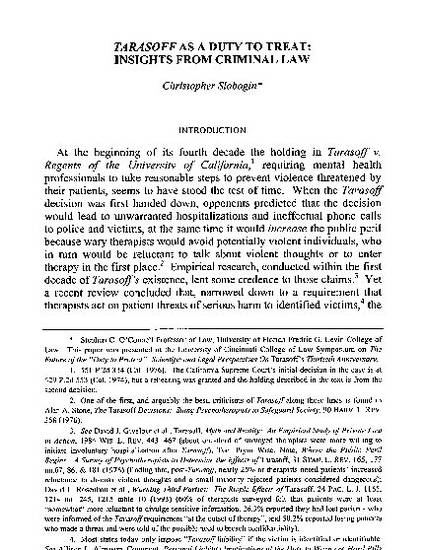
- Tarasoff,
- predictions of dangerousness,
- misprision,
- omission liability
- Criminal Law and
- Law
In most jurisdictions, the Tarasoff duty is defined as a duty on the part of mental health professionals to act on patient threats of serious harm to identified individuals. Although breach of this duty has, to date, only led to civil liability, a good case can that it should lead to criminal liability as well, not just for something minor like a failure to report a potential crime, but for the felony committed by the patient. Furthermore, to the extent Tarasoff requires merely a warning after a serious threat to an identified victim, this civil and criminal liability could logically be imposed on laypeople as well as clinicians, since laypeople are just as adept as clinicians at identifying when a specific individual has been threatened and at warning the potential victim. To avoid that result (which in effect would reinstall misprision of felony as a serious crime), Tarasoff should be reconceptualized as a duty to treat dangerousness, not as an omnibus duty to prevent harm to third parties. As a practical matter, this duty would most likely result in liability (civil and criminal) when a mental health professional: (1) knows that a patient has genuinely threatened an identified person with serious bodily harm; (2) knows that the patient has engaged in conduct aimed at achieving that end; and (3) fails to commit or otherwise treat the patient in a manner calculated to alleviate the danger. In short, this symposium piece argues, a mental health professional in a Tarasoff situation should have a duty to treat but should never have a duty to warn the potential victim or call the police, unless we are also prepared to make non-clinicians equally liable, civilly and criminally, for failing to take such steps under the same conditions.
Available at: http://works.bepress.com/christopher-slobogin/93/
